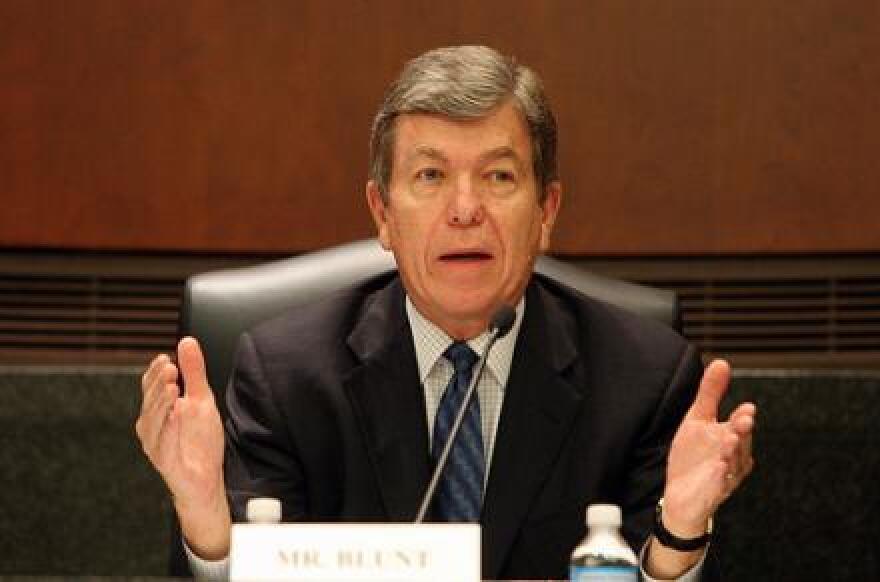When the Republican majority takes over the U.S. Senate in January, Missouri will still have influential friends in high places, but St. Louis and urban interests may lack strong champions.
Democratic senators, such as Claire McCaskill, D-Mo., and Dick Durbin, D-Ill., currently the Senate's second-ranking Democrat, have set the agenda in a way that helped central cities like Chicago and St. Louis, said Dave Robertson, a political scientist at the University of Missouri-St. Louis. But, predicted Robertson, U.S. Sen. Roy Blunt, R-Mo., will move the agenda in a more conservative direction.
Blunt and the Republicans will use their majority to advance the issues and agenda items of more conservative voters in the suburbs and rural areas of the state, added Robertson. They may provide "assistance to St. Louis, but it’s also going to include the kind of things that are strong on the Republican side like tax cuts and cuts in the federal budget.”
Still, any political bacon that Roy Blunt might want to bring home to Missouri as a result of being in the Senate majority leadership beginning next year will have to come wrapped in an ideologically acceptable package for more conservative elements within the Republican Party.
"The traditional things that a position of leadership might help you with -- funding for roads, funding for schools, funding for the pork-barrel projects -- they’re somewhat frowned upon by a significant portion of the Republican electorate,” said George Connor, a political scientist at Missouri State University in Springfield.
“I do think bringing home the bacon is still important, but it’s all in how you package it," continued Connor. "The road to nowhere is the worst example of pork-barreling, but bringing funds to Whiteman Air Force Base or Fort Leonard Wood, those aren’t seen as pork barreling, but it will be up to Blunt to package those in terms of defense.”
On the home front, Blunt's message of “regulatory overreach is going to resonate well back home,” with respect to coal or the the designation of federal protections for rivers and streams.
Blunt will be able to “mitigate economic and environmental regulations that are coming out of the White House,” said Connor. Republicans, especially those in in the southwestern part of the state, are “not anti-environment, but we’re certainly not pro-environment and we are certainly pro-business, especially with respect to energy.”
Blunt’s presence in leadership and in the majority will allow him to push that agenda further than it’s been pushed before.
A new era of cooperation?
After the election, some members of Congress on both sides of the aisle rushed to pledge bipartisan cooperation.
“These election results will change the power balance in Congress — but one thing that remains the same is my commitment to work with all of my colleagues, Republican and Democratic, to forge bipartisan compromise, achieve results for Missouri, and strengthen accountability in our government," said McCaskill. "Congratulations to the winners, and my sincere thanks to those candidates who didn’t win, but still succeeded in making our democracy accountable. Now, let’s get to work.”
U.S. Sen. Mark Kirk, R-Ill., made a similar point: “My role in the U.S. Senate will remain that of bridge-builder. I look forward to finally advancing bipartisan legislation including that which will stop Iran from developing a nuclear bomb, will achieve energy independence, and will tax less, spend less and borrow less of Americans' money.”
Blunt echoed those sentiments as well. On Tuesday night, shortly after it was clear that Republicans had won control of the Senate Blunt issued a statement saying: “I hope President Obama will take this chance to work with the new Republican Congress to pass pro-growth policies that help American families and workers.”

And, said U.S. Rep. Ann Wagner, in a statement following the Republican victory Tuesday night, the voters have endorsed a new agenda. They “have chosen a new direction for our nation. An era that will not be defined by raising taxes, growing the size and scope of the federal government and increasing red tape for small businesses and families, but by empowering the American people to seize control of their own destiny.”
But an era of good will could be short lived. With Republicans in control of Congress, said Connor, “Nothing that is portrayed as giving President Obama a victory will be permissible for the next two years.”
Connor added that even if Obama is willing to come to terms with the House and the Senate on any particular issue, Republicans are likely to present it as “we brought him to his knees, we brought him to us – not the other way around.”
“Outside St. Louis and Kansas City," he said, "there’s still mileage to be gotten out of being anti-Obama.”
Looking ahead, Robertson said, Blunt’s position in the Senate majority will help to strengthen the state’s Republican organization by mobilizing more national resources for state candidates. With state-level elections in Missouri and elsewhere becoming more nationalized with outside support for constitutional issues and legislative candidates, “Blunt's presence at the top of the state delegation in Washington will mean plenty of resources to help Republican candidates at all levels going into the 2016 elections.”




